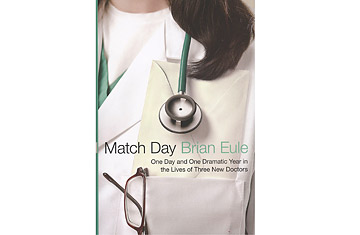
Match Day: One Day and One Dramatic Year
in the Lives of Three New Doctors
By Brian Eule
261 pages; St. Martin's Press
The Gist:
Final year medical students have to endure one of the more painful (and joyful) single days in academia — Match Day. Every graduating med student must submit his or her top residency program choices to a national database; a computer then combines the students' choices with the hospitals' preferences and spits out a match — which both sides are obliged to abide by. On the third Thursday in March, these graduates find out where they will serve their first few years as a hospital intern and resident. It's a day that can define careers — and make or break relationships.
Journalist Brian Eule had an inside track on the turmoil that Match Day can cause in a relationship: his girlfriend Stephanie was herself about to embark upon the long journey to becoming a surgeon. Eule trains his eye on his relationship (and that of two other couples); his book details the havoc that the medical field can wreck on family lives. ("See the Top 10 Medical Breakthroughs of 2008.")
Highlight Reel:
1. On some universities' special Match Day traditions: "On the third Thursday in March, medical schools across the country held gatherings to unveil the computer's results. Some schools waited for the designated hour, then unleashed the students to retrieve the envelopes with their results and braced for a stampede. Others, including Vanderbilt University, called students at random to the front of a lecture hall. On the way, each students dropped a dollar bill into a fishbowl as compensation for the suffering that the last person was to endure while waiting. One by one, they received and opened their envelopes, leaned into a microphone, and announced the result to classmates, family, and anybody watching on Vanderbilt's live Webcast."
2. On the R.O.A.D. to Happiness: "R.O.A.D. stood for residencies in radiology, opthalmology, anesthesiology, and dermatology. These specialties usually paid better than a career in family or internal medicine. For students leaving medical school with an average debt of more than $100,000, income was an important consideration. A R.O.A.D. specialty also meant a better ability to have what doctors called a controllable lifestyle. On the R.O.A.D., schedules were more predictable. There were fewer emergencies. Nights spent on call at the hospital were limited. On the R.O.A.D., a doctor could reliably make good on commitments other than work. On the R.O.A.D., becoming a doctor did not mean choosing career over family."
3. On how to figure out a doctor's specialty: "That was one way you could distinguish a surgeon from another doctor. Internal medicine residents typically draped the stethoscopes over their necks. Some anesthesiologists hung it from a holster on the hip. Surgeons, Stephanie was told in medical school, kept the stethoscope in the coat pocket."
The Lowdown:
Eule is writing about his now-wife and their friends, so the book is bound to be full of overly-cute personal asides. And while there are very few grace-notes (his attempts at flowery descriptive phrases are both unnecessary and square), when he sticks to the facts of his subjects' lives, Eule tells a dramatic tale of the compromises that young doctors (especially women) must make in order to succeed. "No program wanted one of its residents to get pregnant," he writes at one point, rocketing to the heart of the medical training tradition — grueling hours and almost complete devotion to the job. As he writes, many hospitals seem to want to discourage their young doctors from even the idea of having a family life. There's little doubt that anyone who reads Match Day will look at their doctors in the same way.
The Verdict: Read
